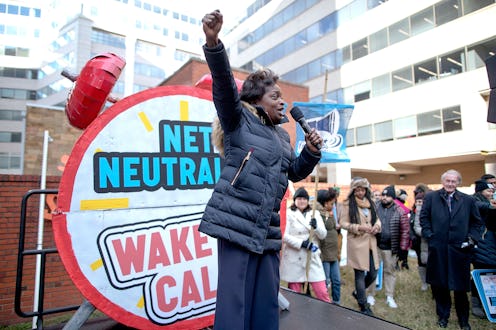
Imagine if women had to pay their internet service providers a premium to share their #MeToo stories on Facebook, or to access a website containing information about reproductive health care. On Thursday, the Republican-majority Federal Communications Commission brought these possibilities closer to reality by voting to repeal Obama-era net neutrality regulations. These regulations, which were implemented in 2015, assured that internet service providers could not influence loading speeds for or limit access to certain apps and websites. The FCC's decision to repeal net neutrality will ultimately harm women, as well as other marginalized groups.
Consumer interest groups are gearing up to challenge the FCC's decision both in courts and in Congress for many reasons. Opponents of the net neutrality repeal have argued that it would limit women's access to information about reproductive health care. They also point out that movements like #MeToo would not be able to take off if consumers experience limited or slower access to certain apps and social media sites. As advocacy group Free Press indicated as part of its campaign to save net neutrality, repealing net neutrality would not only endanger a free and open internet, but also further marginalize the voices of women and girls who are already underrepresented in media spaces.
Earlier this week, New York Sen. Kirsten Gillibrand and FCC member Jessica Rosenworcel co-wrote an editorial for Refinery29 in which they used examples such as the #MeToo movement and the success of women-owned online businesses in order to argue in favor of preserving net neutrality. The following tweets use these and other examples to break down exactly how ending net neutrality would hurt women.
By Further Marginalizing Women's Voices
Women, especially women of color, have often turned to social media and the blogosphere in order to respond to mainstream media reports that misrepresent them. For example, when ESPN host Jemele Hill called Donald Trump a white supremacist on Twitter, celebrities and women around the world defended her as the White House called for her to be fired. And when Brock Turner served just three months in prison after being convicted of sexual assault, people used the #ThingsLongerThanBrockTurnersRapeSentence hashtag on Twitter to express their outrage and keep the conversation going.
These are just two examples; what matters, however, is that women are frequently able to turn to online platforms to talk about issues that matter to them when mainstream media outlets fail to do so. A net neutrality repeal could change that, and not for the better — if consumers have to pay their internet service providers more to access certain sites, for instance, or if providers prioritize sites and apps that they own, it could become a lot harder for consumers to access online content produced by women.
By Negatively Impacting Movements For Justice
This goes hand in hand with further marginalizing women's voices online. The Women's March last January — which had roughly 500,000 participants in D.C. and over 5 million around the world — started as a Facebook event. Tarana Burke launched the Me Too movement 10 years ago to empower girls and young women of color in the face of sexual violence, and it has since become a global campaign against sexual assault thanks to a viral hashtag on social media. Furthermore, the Black Lives Matter network was launched as a hashtag by three black women.
Countless protests against racism, sexism, climate change, homophobia, and other forms of injustice are organized on a daily basis using social media. Now, imagine having to pay a premium to access a social media site like Facebook, on top of what you already pay your internet service provider. Nyasia Valdez, who works with Detroit's Equitable Internet Initiative, told Al Jazeera that "it's poor people, people of color" who would be most affected by a net neutrality repeal. That means the people most affected by injustice will also have more limited access to the movements that attempt to serve them.
By Limiting Access To Health Care Information
According to NARAL Pro-Choice America, "anti-choice extremists could pay to block access to accurate information about reproductive health or even phone data access to calling abortion clinics" if net neutrality is repealed. This is not just a theory: Back in 2007, before net neutrality regulations were implemented, Verizon invoked the right to block “controversial or unsavory” text messages in order to reject NARAL's request to set up a text-message program on its network.
Planned Parenthood echoed NARAL's rejection of a net neutrality repeal, writing on social media that it "opposes any efforts that could limit access to the information and services people need to stay healthy." Indeed, repealing net neutrality will allow internet service providers to privilege certain sites over and others, and will make it even more difficult to get information about abortion and other reproductive health care services.
By Harming Women-Owned Online Businesses
As Gillibrand and Rosenworcel pointed out in their Refinery29 editorial, 90 percent of sellers on Etsy — an online marketplace — are women, as opposed to just one-third of business-owners nationwide. It was net neutrality that "allowed Etsy to grow from a tiny company in a Brooklyn apartment to a global platform that hosts over one million sellers worldwide," according to a statement from the company.
Etsy also lauded the "democratic access" granted by net neutrality as what makes the internet "revolutionary" — and this is an important point. Many women are able to turn to Etsy to sell their products, often for the first time, and other women-owned businesses and start-ups rely on a free and open internet to grow.
Although the FCC has voted to repeal net neutrality, these protections will not disappear overnight, will your favorite websites. After all, consumer interest groups are already prepared to take this fight to Congress and the courts. Nonetheless, it is important to keep in mind just how much women stand to lose from a repeal of net neutrality.